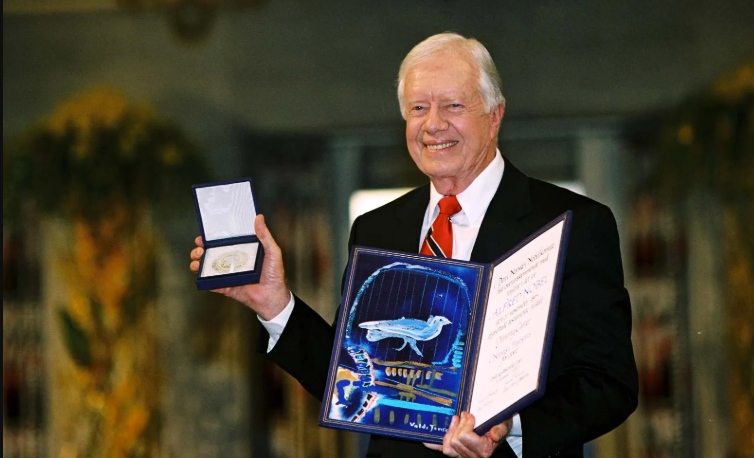By Jemimah Wellington, JKNewsMedia Reporter
A POLITICAL and humanitarian era ended on Sunday as former United States President Jimmy Carter passed away at 100 in Plains, Georgia, surrounded by family.
The Carter Center confirmed the news, marking the end of a life committed to service both in and out of office.
Carter, who led the United States from 1977 to 1981, faced domestic struggles, including inflation and an energy crisis, alongside international challenges such as the Iranian hostage crisis.
While his presidency was marred by economic and geopolitical turbulence, Carter left a lasting legacy of peacemaking, most notably with the historic Camp David Accords between Israel and Egypt.
Following his single-term presidency, Carter redefined what it meant to be a former president.
Through the Carter Center, he championed human rights, eradicated diseases like guinea worm, and tirelessly built homes for the underprivileged with Habitat for Humanity.
Carter’ss global impact, from advancing democracy to overseeing elections, remains unmatched in modern history.
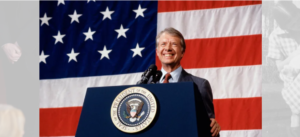
Joe Biden and Donald Trump Mourn
President Joe Biden hailed Carter as “an extraordinary leader, statesman, and humanitarian.”
U.S. President-elect, Donald Trump also extended condolences, noting the immense challenges Carter faced during his presidency and expressing gratitude for his contributions to the nation. He also recognised Carter’s contributions to the nation.
Carter’s later years, though physically challenging, were marked by resilience, exemplified by his participation in building projects and teaching Sunday school despite health setbacks.
Born on October 1, 1924, Carter was the first U.S. president born in a hospital.
His humble beginnings as a peanut farmer in Plains shaped his modest and service-oriented approach to life.
He shared 77 years of marriage with his beloved wife, Rosalynn, whose death in November 2023 deeply affected him.
The couple’s devotion to each other and their work has inspired millions.
Also, the late Jimmy Carter’s unique ability to combine faith, humility, and determination into action leaves behind a legacy of hope and change.
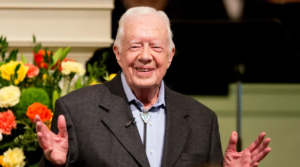
Legacy of Leadership: Jimmy Carter’s Historic Life
ON SUNDAY, the global community lost a monumental figure, former President Jimmy Carter.
He passed away on Sunday in Plains, Georgia, at the age of 100.
With confirmation from the Carter Center, his demise comes months after entering home hospice care in February 2023, following several hospital visits.
Jimmy Carter’s legacy transcends his term as the 39th president of the United States from 1977 to 1981.
While his presidency was marked by a mix of achievements and challenges, it is his post-presidential life that cemented his place as a humanitarian icon.
Carter’s journey, from a Georgia peanut farmer to a Nobel Peace Prize winner, epitomised unwavering commitment to public service and human dignity.
The late Carter was the first U.S. president born in a hospital. He grew up in a modest household, shaped by the ethics of hard work and a deep sense of morality.
After graduating from the U.S. Naval Academy in 1946, he served in the Navy, only to return home to take over the family peanut farming business following his father’s death.
Carter’s foray into politics began in the Georgia State Senate before he became governor in 1971.
As president, Carter pledged to restore honesty and transparency to a nation recovering from the Watergate scandal.
His administration is remembered for significant foreign policy successes, including the Camp David Accords, which brought peace between Israel and Egypt, and the formalisation of diplomatic relations with China.
However, his presidency faced substantial domestic and international hurdles.
The Iran hostage crisis, soaring inflation, and an energy crisis overshadowed many of his initiatives.
These challenges ultimately led to his loss to Ronald Reagan in the 1980 presidential election.
Despite the difficulties of his presidency, Carter’s post-White House life became an unparalleled example of global service.
He founded the Carter Center in 1982, which focused on advancing human rights, eradicating diseases such as Guinea worm, and promoting democratic governance worldwide.
His dedication earned him the Nobel Peace Prize in 2002.
Carter’s personal life was also deeply rooted in his faith and his love for his wife, Rosalynn, whom he married in 1946, and they shared 77 years of marriage before Rosalynn’s passing in November 2023.
Their bond was a cornerstone of Carter’s life, and he continued to honour her memory in his final months.
Carter’s enduring legacy includes his hands-on work with Habitat for Humanity, building homes for those in need even in his later years.
His commitment to service was evident in his 43 years of retirement, which he described as an opportunity to live out his values and make a meaningful impact.
Carter is survived by his children, grandchildren, and a world that continues to benefit from his vision for justice and peace.
The centenarian, who once reflected that “we must adjust to changing times and still hold to unchanging principles,” leaves behind a legacy that will inspire generations.
Throughout his life, Jimmy Carter embodied a commitment to service, peace, and humanitarian efforts that transcended his time in the White House. His post-presidency was marked by a steadfast dedication to addressing global challenges, from eradicating diseases like Guinea worm to mediating conflicts and advocating for human rights.
In his later years, Carter continued to inspire by demonstrating resilience and a focus on meaningful contributions, even as his health declined.
He frequently returned to his roots in Plains, Georgia, cherishing moments with his wife, Rosalynn, and their family while staying engaged with the work of the Carter Center.
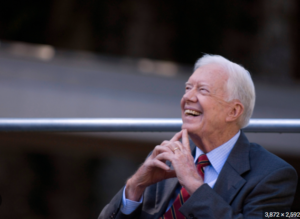
Marital Bliss
Jimmy Carter described marrying Rosalynn as the “pinnacle” of his life during a news conference in August.
At the point of his death on Sunday, he is survived by four children—Jack, Chip, Jeff, and Amy—along with 11 grandchildren and 14 great-grandchildren, as noted by the Carter Center.
In April 2021, President Joe Biden and First Lady Jill Biden visited the Carters at their home in Plains, Georgia, as the former presidential couple could not attend Biden’s inauguration earlier that year.
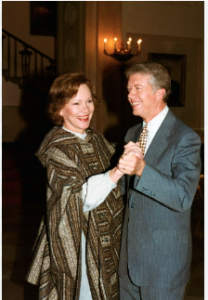
An Unlikely Path to the Presidency
Jimmy Carter’s rise to the presidency was far from conventional.
Initially dismissed as a long shot, the former Georgia governor and Navy submariner defied expectations by tirelessly campaigning in Iowa’s small towns and cornfields.
His grassroots approach helped solidify Iowa’s reputation as a crucial starting point for outsider candidates, a strategy later mirrored by figures like Barack Obama.
After winning the Democratic nomination in 1976, Carter presented himself as a Washington outsider.
At the Democratic National Convention in New York, he stood beside his running mate Walter Mondale, his wife Rosalynn, and their daughter Amy.
Carter vowed to challenge the political establishment and rebuild trust in government—a promise that resonated deeply with a country still reeling from the Watergate scandal and the Vietnam War.
Carter’s directness became a hallmark of his campaign. In one memorable moment, he admitted in an interview with Playboy that he had looked on women with lust, confessing to “adultery in my heart many times.”
Despite such controversies, his down-to-earth persona, grounded in humility and faith, appealed to voters seeking a leader they could trust.
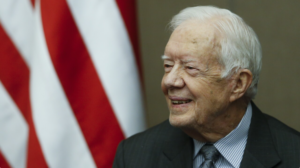
A Presidency Focused on Human Rights
After Carter defeated Gerald Ford by 297 to 240 electoral votes, he became the 39th president of the United States.
In his inaugural address, he pledged to make human rights the cornerstone of American foreign policy.
His most notable achievement was brokering the Camp David Accords in 1978, a landmark peace agreement between Egypt and Israel.
The treaty, signed by Egyptian President Anwar Sadat and Israeli Prime Minister Menachem Begin, marked the first peace deal between Israel and an Arab nation.
Beyond the Middle East, Carter made strides in other regions.
He signed treaties returning control of the Panama Canal to Panama, reducing tensions in Latin America.
In Asia, he formalized diplomatic relations with China, severing ties with Taiwan to establish a historic agreement with Beijing.
Domestically, he created the Department of Energy and championed renewable energy by installing solar panels on the White House roof.
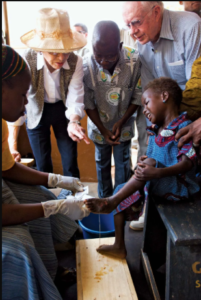
Challenges and Crises
Despite these achievements, Carter faced mounting challenges. His presidency was marked by an energy crisis, economic struggles, and a perception of national malaise.
A speech in 1979, addressing what he termed a “crisis of confidence,” backfired politically, reinforcing the image of a leader overwhelmed by the nation’s problems.
Carter’s foreign policy faced its most significant test during the Iran hostage crisis.
After allowing the ousted Shah of Iran to seek medical treatment in the United States, Iranian revolutionaries stormed the U.S. Embassy in Tehran, taking 66 Americans hostage.
A failed rescue mission and the prolonged 444-day standoff eroded public confidence in Carter’s leadership, ultimately sealing his defeat in the 1980 election to Ronald Reagan.
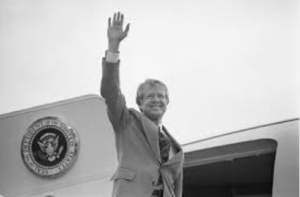
A Humble Beginning
Born on October 1, 1924, in Plains, Georgia, Carter grew up in a segregated society during the Great Depression.
His upbringing in a house without electricity, coupled with his interactions with African American children, shaped his views on equality and integration.
After serving in the Navy and studying nuclear physics, Carter returned to Georgia to manage his family’s peanut farm, laying the groundwork for his future in politics.
On the overall, Carter’s life and legacy are defined by his commitment to service, human rights, and humility.
From the cornfields of Iowa to the Camp David summit table, his journey was marked by perseverance, integrity, and a deep belief in the power of leadership to inspire change.

